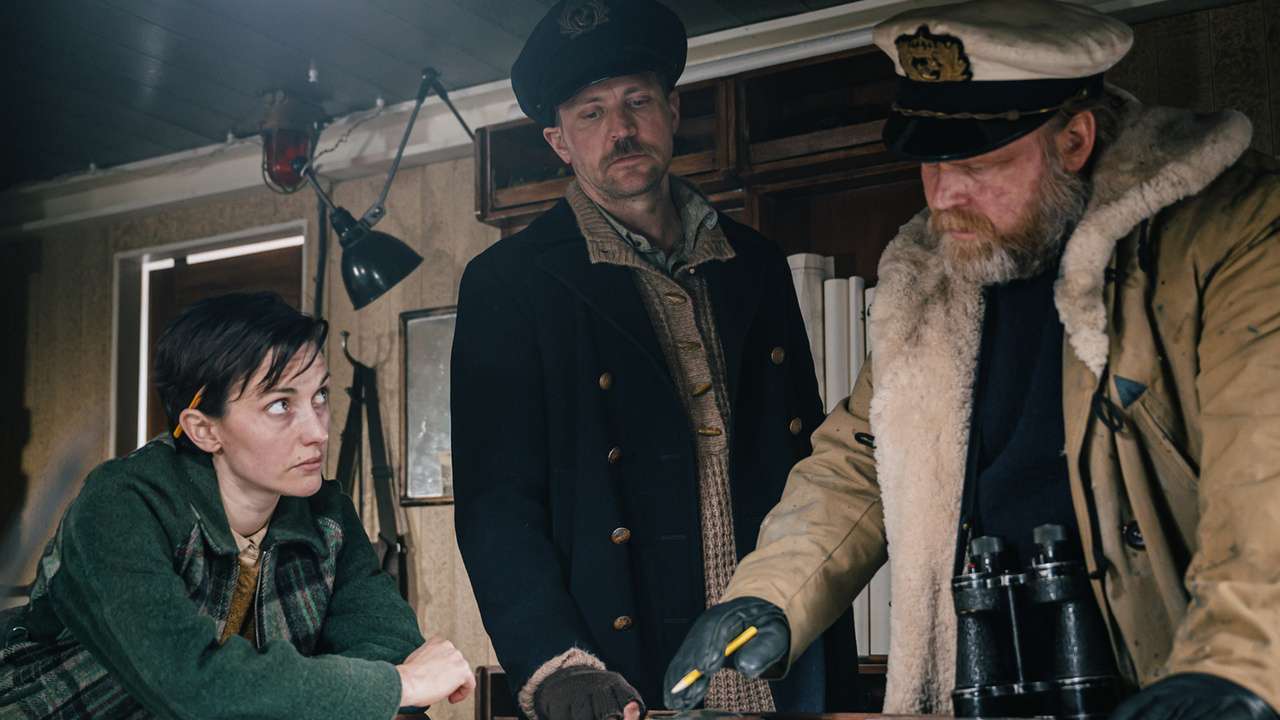“The Arctic Convoy” (2023), originally titled “Konvoi,” draws inspiration from the true events of World War II. Set in 1942, the story follows a convoy tasked with delivering supplies from Iceland to Murmansk, Russia. It appears to be loosely based on the incredible story of convoy PQ17, which endured devastating losses due to relentless attacks from German pilots and U-boats. The convoy faces a critical turning point when the British withdraw their protective freighters, leaving the ships vulnerable to German attacks. Despite this, the captain of one ship chooses to press on with the mission, defying the advice of most of his colleagues who urge a retreat to Iceland. Do they manage to deliver the supplies while fending off the German onslaught, or are they forced to abandon their mission? Let’s delve deeper into the plot to uncover the answers.
Spoilers Ahead
The Arctic Convoy (2023) Plot Summary & Movie Synopsis:
Why does Skar Want to Continue with the Mission?
Captain Skar’s decision to proceed with the mission stems from his unwavering sense of duty. Despite the British abandoning the convoy and his crew expressing doubts, Skar believes that their role in the mission is critical. His resolve is rooted in the understanding that the supplies they are transporting are vital for Russia and the allies in their fight against Germany. For Skar, retreating would not only mean abandoning the mission but also betraying the trust placed in them to deliver these essential resources.
Skar’s reasoning also reflects his deep awareness of the broader stakes of the war. He understands that the Germans are targeting the convoy because they recognize the importance of the supplies in strengthening the Allies’ resistance. Skar knows that if these supplies fail to reach their destination, Germany could gain a significant advantage. It will potentially tip the scales of the war in their favor. This strategic insight fuels his determination to press on, even when faced with overwhelming odds.
As a leader, Skar embodies courage and resolve. While his first mate, Mork, and engineer Erik voice their reluctance to continue, Skar does not let fear dictate his actions. He keeps most of his concerns to himself, possibly to maintain morale among the crew. Skar’s actions highlight his belief that true leadership involves making tough decisions, especially in times of crisis.
What Happens to Isaksen?
Isaksen’s death is a harrowing moment for the crew. After risking his life to clear the mines alongside Sigurd, Isaksen’s rope loosens, causing him to fall into the ocean. Despite his desperate screams for help, the ship, driven by the tide, drifts too far to mount a rescue. The young radio operator’s life is lost in the line of duty, underscoring the dangerous nature of their mission.
Captain Skar’s decision to move forward, even after witnessing Isaksen’s tragedy, reflects his cold, pragmatic leadership. While the loss visibly shocks him, Skar understands that halting the mission to attempt a rescue could jeopardize the entire crew and the supplies they are carrying. The mines and potential threats in the waters demand immediate focus, forcing him to suppress his grief and prioritize the mission’s success over individual lives.
How does Mork Get Control of the Ship?
Mork assumes control of the ship following a series of calamities. Two German aircraft attack the convoy, causing severe damage. Although Johan successfully shoots down both planes, the deck is left in flames, resulting in the death of Evensen and critical injuries to Captain Skar. With Skar unable to command, Mork, as the first mate, is thrust into the role of captain by default.
Mork faces resistance from Ragnhild, who opposes abandoning the mission. However, he takes a drastic step to ensure compliance by injecting Skar with additional morphine, incapacitating him further. This calculated move eliminates the possibility of Skar intervening and solidifies Mork’s control. It reveals Mork’s willingness to undermine authority to protect what he believes are the crew’s best interests.
Why does Mork Decide to Return to Iceland?
Mork decides to return to Iceland, prioritizing the safety of the crew over the mission’s success. Mork’s actions are driven by the overwhelming sense of vulnerability among the crew. The previous rebellion, sparked by the realization that they were left unprotected against German forces, further reinforces his belief that turning back is the safer course.

Despite the earlier rebellion, Mork manages to convince the crew to follow his orders. His reasoning aligns with their growing fear and weariness after witnessing multiple deaths, including Isaksen’s and Evensen’s. While Skar had previously inspired the crew to honor sacrifices and push forward, his incapacitation shifts the balance of influence toward Mork’s more cautious and self-preservative approach.
Mork’s takeover is pragmatic, rooted in a desire to avoid further loss of life. However, it also reflects a fundamental difference in leadership philosophy. Unlike Skar, who sees the mission as a moral obligation, Mork prioritizes survival over duty. His actions underline the psychological toll of war and the ethical dilemmas faced by those in command. While his decision to return may save lives, it also risks undermining the larger war effort, leaving his leadership both necessary and controversial.
The Arctic Convoy (2023) Movie Ending Explained:
How Does Mork’s Decision Save the Convoy?
Mork’s quick thinking and adaptability play a crucial role in saving the convoy. After realizing they are stuck near Spitsbergen in a vulnerable position, Mork devises a creative plan to camouflage the ship by painting it white. This decision stems from his awareness of their environment. The icy landscape offers a natural disguise if utilized effectively. The camouflage aims to make the ship nearly invisible to the approaching German aircraft, minimizing the likelihood of detection.
Mork knows that firing at the aircraft, even if successful, could alert German reinforcements, leading to an inevitable and catastrophic attack. By focusing on stealth rather than confrontation, Mork prioritizes the safety of the convoy over engaging in risky combat. His decision demonstrates his ability to think beyond immediate threats and consider long-term consequences.
Mork’s leadership fosters collaboration among the crew. When Skar insists on shooting down the aircraft, Mork challenges him, presenting a logical argument that gains the support of Johan and Ragnhild. Mork’s reasoning persuades Johan to withhold fire, showing the importance of knowing when to act and when restraint is the better option. This collective decision underscores Mork’s influence and ability to guide the crew toward a unified course of action.
The plan’s success hinges on precise execution and the crew’s trust in Mork’s judgment. As the aircraft fails to distinguish the ship against the icy backdrop, the convoy avoids detection, proving the effectiveness of the camouflage. Even Skar, initially rigid in his approach, acknowledges the merit of Mork’s decision. By prioritizing stealth over aggression, Mork not only saves the convoy but also showcases a leadership style rooted in ingenuity and calculated risk-taking.
What does Mork Decide at the End?
Mork surprises the crew by deciding to continue the mission to Russia, despite his earlier intent to turn back. This shift reflects his growing understanding of the mission’s significance. Inspired by Skar’s resilience and Ragnhild’s earlier assertion that no one would expect the convoy to succeed under such dire circumstances, Mork realizes the strategic importance of delivering the supplies.
This decision marks a transformation in Mork’s character. He now embraces the responsibility and risks associated with their task. He adopts Skar’s sense of duty but tempers it with empathy. Unlike Skar’s seemingly relentless focus on the mission, Mork combines strategic thinking with genuine concern for the crew’s morale and well-being.
Mork’s resolve is bolstered by Skar’s indirect approval. Skar reveals that Mork’s attempts to incapacitate him with morphine were ineffective due to improper administration, suggesting that Skar was aware of Mork’s intentions all along. This tacit support from Skar helps Mork gain confidence in his ability to lead, showing that Skar views him as a worthy successor.






